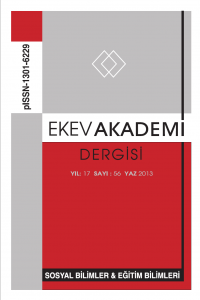Abstract
İnsancıl Yaklaşımın ortaya çıkmasıyla birlikte dil öğrenimi sürecine farklı şekilde yaklaşılmaya başlanmıştır ve birey odak noktası olmuştur. Dil öğretimi alanında neden bazı öğrenenlerin daha başarılı olduğu konusu araştırılmıştır ve cinsiyet, güdülenme, öğrenme biçemi gibi bireysel farklılıklar üzerinde durulmuştur. Bu çalışmada da temel olarak öğrenenlerin alan bağımlı, bağımsız ya da nötr olmasıyla öğrenme biçemleri arasında anlamlı bir bağıntının olup olmadığına bakılmıştır. Bu çalışma, İngilizceyi yabancı dil olarak öğrenen 18 kişilik bir üniversite hazırlık sınıfında uygulanmıştır. Öğrencilerin öğrenme biçemleri Kolb’un öğrenme biçemi envanteri kullanılarak tespit edilirken bilişsel biçemleri, alan-bağımlı olup olmadıkları ise Grup Saklı Şekiller Testi (Group Embedded Figures Test) ile bulunmuştur. Toplanan veriler doğrultusunda bilişsel biçemin, yani alan bağımlı olup olmamanın öğrenme biçemin üzerinde önemli bir etkisi olduğu sonucuna ulaşılmıştır. Diğer taraftan, daha kesin sonuçlara ulaşmak için bir ön araştırma niteliğinde olan bu çalışmanın daha fazla katılımcıyla yenilenmesine ihtiyaç vardır
References
- Abraham, R. (1983). Relationships between use of strategy of monitoring and cognitive style. Studies in Second Language Acquisition, 6, 17-32.
- Alavi, S. M., Kaivanpanah, S. (2009). Examining the role of individual differences in lexical inferencing. Journal of Applied Sciences, 9 (15), 2829-2834.
- Aşkar, P., Akkoyunlu, B. (1993). Kolb öğrenme stili envanteri, Eğitim ve Bilim Dergisi, 87, 37-47.
- Brown, H. D. (2000). Principles of language learning and teaching. New York: Longman.
- Carter, E. (1988).The relationship of field dependent/independent cognitive style to Spanish language achievement and proficiency: a preliminary report. Modern Language Journal, 72, 21-30.
- Cesur, M. O. (2008). Üniversite hazırlık sınıfı öğrencilerinin yabancı dil örenme stratejileri, öğrenme stili tercihi ve yabancı dil akademik başarısı arasındaki açıklayıcı ve yordayıcı ilişkiler örüntüsü. Yayınlanmamış doktora tezi. İstanbul: Yıldız Teknik Üniversitesi, Sosyal Bilimler Enstitüsü.
- Chapelle, C. A. (1995). Field-dependence/field-independence in the L2 classroom. J. M. Reid (Ed.), Learning styles in the ESL/EFL classroom (ss.158–168). Boston: Heinle and Heinle.
- Chapelle, C., Roberts, C. (1986). Ambiguity tolerance and field independence as predictors of proficiency in English as a second language. Language Learning, 36, 27-45.
- Çaycı, B. ve Ünal, E. (2007). Sınıf öğretmeni adaylarının sahip oldukları öğrenme stillerinin çeşitli değişkenlere göre incelenmesi. Bilim, Eğitim ve Düşünce Dergisi, 7(3), 1-16. http://www.universite-toplum.org/text.php3?id=328 Day, R. (1984). Student participation in the ESL classroom, or some imperfections of practice. Language Learning, 34, 69-102.
- Demirbaş, O.O. ve Demirkan, H. (2003). Focus on architectural design process through learning styles. Design Studies, 24 (5), 437-456.
- Dörnyei, Z. (2005). The psychology of the language learner: Individual differences in second language acquisition. Mahwah, NJ: Lawrence Erlbaum Associates.
- Ehrman, M., Leaver, B.T., Oxford, R. L. (2003). A brief overview of individual differences in second language learning. System, 31, 313-330.
- Ekici, G. (2003). Öğrenme stiline dayalı öğretim ve biyoloji dersi öğretimine yönelik ders planı örnekleri. (1. Baskı) Ankara: Gazi Kitabevi.
- Ellis, R. (1990). Individual learning styles in classroom second language development. J. de Jong & D. Stevenson (Eds.), Individualizing the assessment of language abilities. Multilingual Matters.
- Gencel, İ. E. 2006. Öğrenme stilleri, deneyimsel öğrenme kuramına dayalı eğitim, tutum ve sosyal bilgiler program hedeflerine erişi düzeyi. Yayımlanmamış doktora tezi. İzmir: Dokuz Eylül Üniversitesi Eğitim Bilimleri Enstitüsü.
- Hansen, J, C. Stansfield, C. (1981). The relationship of field dependent-independent cognitive styles to foreign language achievement. Language Learning, 31, 349- 367. Hassa, B. (1988). Field dependence/independence cognitive style and EFL proficiency among Egyptian college students. Unpublished PhD thesis. New Mexico: The University of Mexico, Curriculum and Instruction in Multicultural Teacher Education.
- Hasırcı, Ö. (2006). Sınıf öğretmenliği öğrencilerinin öğrenme stilleri: Çukurova Üniversitesi örneği. Eğitimde Kuram ve Uygulama Dergisi, 2 (1), 15-25.
- Hoffman, S. Q. (1997). Field dependence/independence in second language acquisition and implications for educators and instructional designers. Foreign Language Annals, 30, 221–234.
- Kılıç, E. (2002). Baskın öğrenme stilinin öğrenme etkinlikleri tercihi ve akademik başarıya etkisi. Eğitim Bilimleri ve Uygulama, 1 (1), 1-15.
- Kolb, D.A. (1984). Experiental learning: experience as the source of learning and development. New Jersey: Prentice-Hall.
- MacNeil, R. D. (1980). The relationship of cognitive style and instuctional style to the learning performance of undergraduate students. Journal of Educational Reserch, 73 (6), 354-360.
- Rasinski, T. (1984). Field dependent/ independent cognitive style research revisted: do field dependent readers read differently than field independent readers? Reading Psychology, 5, 303-322.
- Seliger, H. (1977). Does practice make perfect? A study of the intearction patterns and L2 competence. Language Learning, 27, 263-278.
- Şimşek, A. (2004). Öğrenme stili. Y. Kuzgun, D. Deryakulu (Eds.), Eğitimde bireysel farklılıklar. Ankara: Nobel Basımevi.
- Witkin, H. A., Oltman, P. K., Raskin, E., & Karp, S. A. (1971). The group embedded figures test. Palo Alto, CA: Consulting Psychological Press.
Details
| Primary Language | Turkish |
|---|---|
| Journal Section | Research Article |
| Authors | |
| Publication Date | July 12, 2013 |
| Published in Issue | Year 2013 Issue: 56 |

